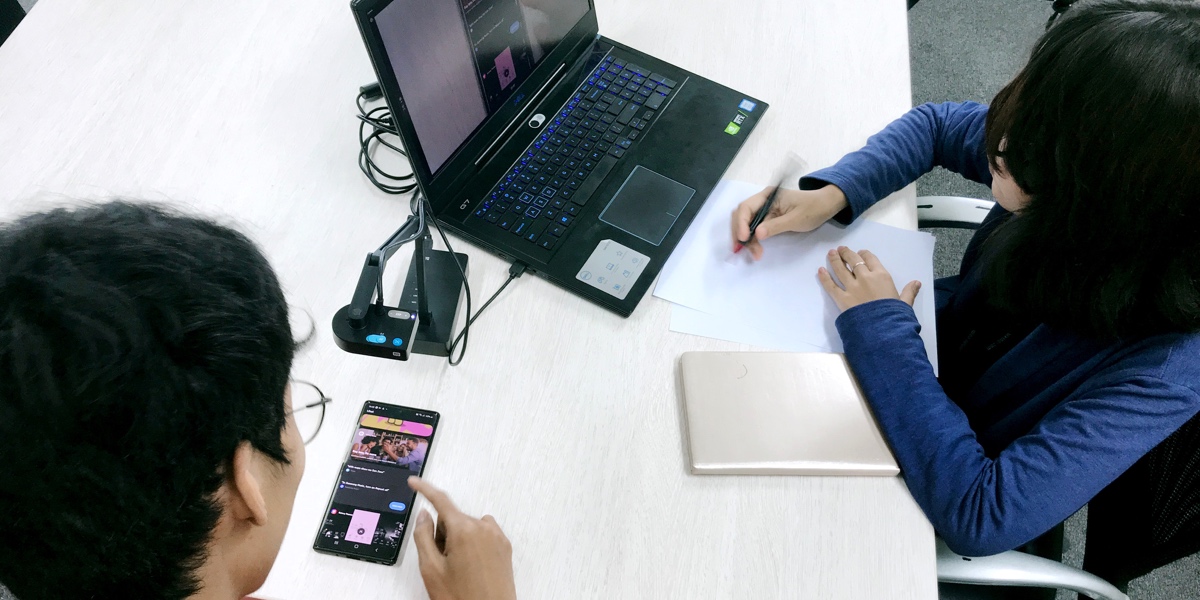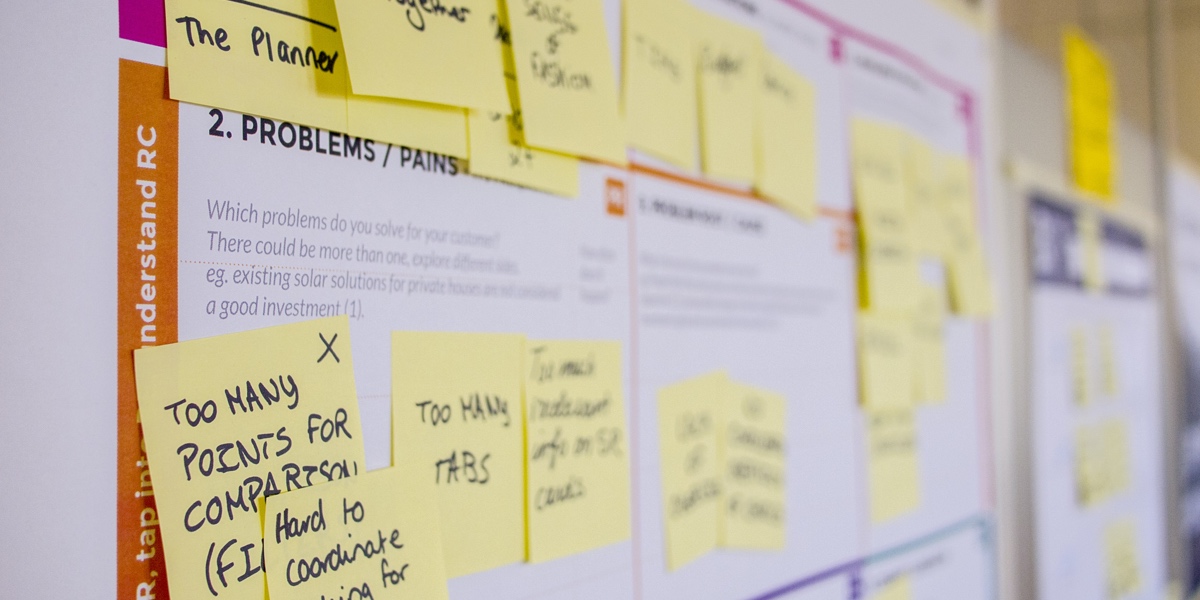From visual design to analytics, there are many skills utilized by UX designers.
However, if you love conducting user interviews, user testing, and data analysis—or you have a particular affinity for the research aspects of UX design, a career as a UX researcher (or as a UX design specialization) could be just the thing for you.
We sat down with Toluwani Oluyemi, an Associate UX Researcher at UserTesting (Atlanta, GA), to get the scoop on all things UX research.
In this interview, she discusses what it’s like to be a UX researcher, what it takes to become one, and the benefits and the challenges of the job.
Toluwani’s experience as a financial analyst turned UX researcher and her time as Associate UX Researcher with UserTesting has given her some amazing insights we can’t wait to share. Here’s what we asked:
- How long have you been a UX researcher and what got you interested in the field?
- How did you get into UX research? What training or schooling did you complete?
- Describe the company you currently work for and your role
- Can you discuss your starting and current salary?
- What does a typical day as a UX researcher look like?
- Who do you collaborate with most on a daily basis?
- What’s your favorite thing about your job as a UX researcher?
- What have been your biggest challenges as a UX researcher?
- How do you use your knowledge of UX design in your job as a UX researcher?
- What are some “must have” skills for UX researchers?
- What are some “nice to have” skills for UX researchers?
- Best piece of DO advice for people looking to follow a similar career path?
- Best piece of DON’T advice?
- Key takeaways
Now, let’s get started! Meet Toluwani.

1. How long have you been a UX researcher and what got you interested in the field?
I’ve been a UX Researcher for the past 1.5 years now. I originally heard about design thinking during an internship in college.
I helped the company I was interning for recreate their job application portal. We interviewed people and got to do affinity mapping with all those sticky notes, and I remember thinking, “This is so cool!” And it made a lot of sense to me. The experience got me thinking about UX but I didn’t actually take the leap until a few years later.
2. How did you get into UX research? What training or schooling did you complete?
After working at an insurance company and feeling like it wasn’t the right fit, I thought there was no better time than the present to really do what I want. So, I ended up doing the General Assembly UX bootcamp in Atlanta, GA.
I learned about both design and research, but the research part really clicked. Plus, it worked well with my background so I decided that’s the route I was gonna pursue.
3. Describe the company you currently work for and your role.
I currently work for UserTesting. The main product the company offers is a platform which provides user testing services so companies can do their own research—moderated or unmoderated. We provide a panel of people they can connect with who can actually answer their questions—or even screen for certain people that fit their user criteria.
I am an Associate UX Researcher there, so I work with our professional services team. We do research for clients that either don’t want to do it themselves or don’t have the time, bandwidth, resources, or expertise to do it on their own. Clients generally come to us with an objective they want to test or questions they want answered and we’ll figure out a plan on how to get that info.
We write test plans (instructions for user testing) depending on what the client wants. So, if they just want to chat with people or if they want more of a discovery session, we’ll put together a list of questions we’ll ask the users. If the client wants someone to test a prototype or website, we’ll organize that.
We define what we’ll ask users to do, what we’ll ask them, etc, and we always get our clients to sign off on the test plan to make sure it aligns with what they want to get out of the study.
Sometimes, if we’re working with a client’s researcher, they might already have a test plan or some preliminary ideas that we’ll flesh out. Then, we run the studies, analyze all the findings, put together a report, and present it to the client.

Photo by UX Indonesia on Unsplash
4. Can you discuss your starting and current salary?
Yes, I can. I will say, I did not negotiate—which I probably should have done, but I was just excited to be getting the job! They offered me $68,000 and I was like, “Yeah I’ll take it! Sounds good.” I think I should have negotiated more, but I just wanted to get in the door.
Now I’m making $70,000 based on a merit increase. I have been with the company for about a year and a half so now I’m trying to think about promotions and that next step.
(Glassdoor reports the average UX Researcher yearly salary at $94,765 with a low of $68,000 and high of $127,000.)
5. What does a typical day as a UX researcher look like?
It depends on where I’m at in the process. Generally, I’m working on 2-3 projects at a time. In one day I might be working on a test plan for one project, writing a report for another, and making sure another project has enough participants.
I’ll tell you a little about my day today. I have a report due at the end of the week to one of our clients. I have a supporting researcher who helps me do some of the analysis, so I went through their work and now I’m writing the report and making sure everything sounds good.
I’ll pull in insights, quotes, clips of the participants, graphs, and screenshots—all that cool stuff. Depending on the type of study, I might be moderating sessions or interviews. That’s usually a whole day of talking to people and hearing their experience with whatever I’m testing.
Sometimes I’ll have days with professional development stuff. For instance, tomorrow I’m taking a course about visual design and storytelling. I’m definitely feeling like I’m losing some of the UX/UI design stuff I learned because I don’t really use it often. But I want to figure out a way to make my reports more compelling, heart-hitting, and visual. So, that’s what I’m trying to learn from this course.
All in all, it varies—but I definitely stay busy! It can be a lot, I’m not gonna lie. I’ve been on a new team for four months and it’s taken some adjustment. Now, every project is a new client. Meaning that every project involves a new person with different writing or work styles, different skills, and different levels of involvement.
I’ll usually reach out to researchers who have worked with them in the past and ask if there is anything I need to know about their work habits or any little quirks I need to know about them. But, it can add up to a lot of little stuff to keep in your head—so it’s teaching me to be flexible and have a more consultative approach.
6. Who do you collaborate with most on a daily basis?
It’s a mix. Our stakeholders are usually the client’s researchers, product/project managers, or heads of design departments. In terms of my day to day, I probably collaborate most with my own team—reaching out to other researchers within the company if I’m struggling with something or want to bounce an idea off of them.
In my department, we have a process to have our test plans and reports reviewed by a team lead or manager; so I communicate with my team lead a lot in terms of just thinking through ideas or reviewing reports and test plans and getting feedback.

Photo by You X Ventures on Unsplash
7. What’s your favorite thing about your job as UX researcher?
It’s really awesome to be able to have a big impact on stakeholders—either by validating some hypotheses they already had, or by completely dispelling them with the research and saying, “Okay, this is why users are really dropping off.”
I had a readout of results with a client about a month ago, and they started having all these conversations amongst themselves, getting really excited about it. They had some hypotheses that the research backed, but then there were lots of other insights they didn’t even think about. It was really cool to hear them get so excited about the research and how they were gonna incorporate it into how they design their product.
That’s definitely the best part—though it’s an aspect of the job that I feel a bit removed from right now, doing so many different projects for different clients. I research for all these people, but I don’t always see the outcome because I don’t often see the whole product life cycle. I could reach out and say, “Hey, did you do anything with the research? If you did, did you notice higher conversion rates?” But it can be hard to get that information. So, when clients are already talking about it in the readout with me it’s really awesome to hear.
8. What have been your biggest challenges as a UX researcher?
What I was saying earlier about not being able to see the outcome of the research I do—that’s definitely a challenge. Since I’m not on the research/design/product team with my clients, I don’t know what they’re doing after we deliver the research.
And I definitely feel like imposter syndrome has been a big one for me—feeling like everything has to be perfect or I don’t know what I’m doing. It’s taken almost a year to really feel confident and feel like, “Okay, I know what I’m doing, I can do this.”
On the other hand, as with so many jobs, it doesn’t always feel as magical as it did in the beginning. The work definitely feels more routine these days. It’s always great when I have projects that are more challenging, something I’ve never done before, or using a new methodology because it breaks me out of that mold.
It’s good that I’m not feeling stressed about every little thing or every project, but I don’t want to get to the point where it’s automatic. I want to always be thinking through what I’m doing and the decisions I’m making.
9. How do you use your knowledge of UX design in your job as a UX researcher?
I think about design when I’m putting my reports together and following hierarchy laws or thinking of readability. But, even then, our company has a style guide so I can’t just go off and do my own thing—it still has to fit within their template and what they want their reports to look like. Which makes sense that it should be standardized, but I don’t get to do as much with design.
10. What are some “must have” skills for UX researchers?
In terms of UX qualifications, anyone who is empathetic and knows how to talk to people and communicate effectively will be fine. Everything else you can learn. But those are key skills you need to have.
One thing I’ve developed over time in this job is how I approach my analysis. I had to learn how to really look at the big picture, rather than getting lost in the details or taking forever to get through an analysis. It’s important to get good at analyzing in a quick manner and synthesizing information into a report that isn’t 40 slides long.
There are a lot of interesting or cool things I can point out to a client, but do they really care? Is it actually relevant to what they need? So it’s important to develop your own approach to staying focused and conducting analysis quickly.
And keep in mind that this is a relatively new industry. It’s constantly changing, so continuous learning is really important. Broaden your knowledge. Anyone who thinks they know it all more than likely doesn’t.
11. What are some “nice to have” skills for UX researchers?
Being able to pair quantitative and qualitative data together to get a better view of your users is key. So, our clients might come with a bunch of statistics like, “50% of our users are falling off at this point.” But, why is that? Figuring out the why of what’s happening and being able to see the big picture is really important.

Photo by Daria Nepriakhina on Unsplash
12. Best piece of DO advice for people looking to follow a similar career path?
Take some sort of negotiation course—not just when you’re searching for a job but once you land it and are talking about promotions and better compensation. Know the range of compensation for new researchers in your area so when you hear a number you’ll know if that falls in line or not.
And this is pretty general, and not specific to UX, but just make sure the company offering you work is the right fit for you. Ask lots of questions, learn about their culture, how people work, and what their expectations are. Is everybody working on the weekend and they expect you to reply or is it a clock out at 5pm and you’re done sort of thing?
And be optimistic! You’ll learn a lot on the job, so just come with an open mind, a willingness to learn and try new things, and you’ll be golden.
13. Best piece of DON’T advice?
Don’t take a job just because you need one. Make sure you look at the company culture and whether it’s somewhere you really want to be. Even if it’s not long term, finding the right cultural fit is important if you want to really thrive there.
Don’t have a ‘know-it-all’ attitude. Come with more of a beginners mind and the desire to dive in and learn more. People generally act more positively towards someone who can admit they don’t know it all and are willing to learn.
14. Key takeaways
Jumping into a niche career like UX research can feel like a big step. While there is a small risk of losing some of those UX/UI skill sets you learned in training, there is great opportunity to immerse yourself in really exciting research practices and concepts.
UX research really gets at the heart of product design by testing different hypotheses, gathering data from users, analyzing that data, and presenting it in a way that stakeholders can use for positive change. And as Toluwani tells us, with empathy, an open mind, and a willingness to learn, UX research can be a fulfilling career path for any prospective UXer. This is being proven by how many UX research-specific bootcamps there are out there.
If you’d like to learn more about UX research, check out these other articles on the CareerFoundry blog:
